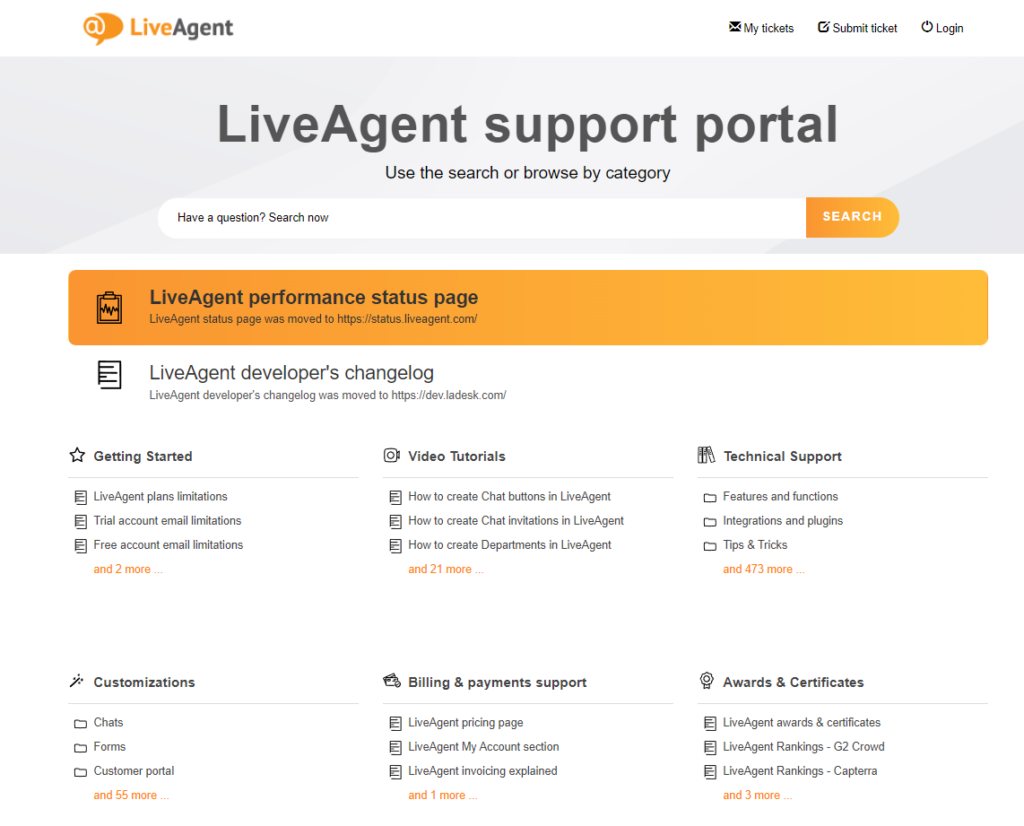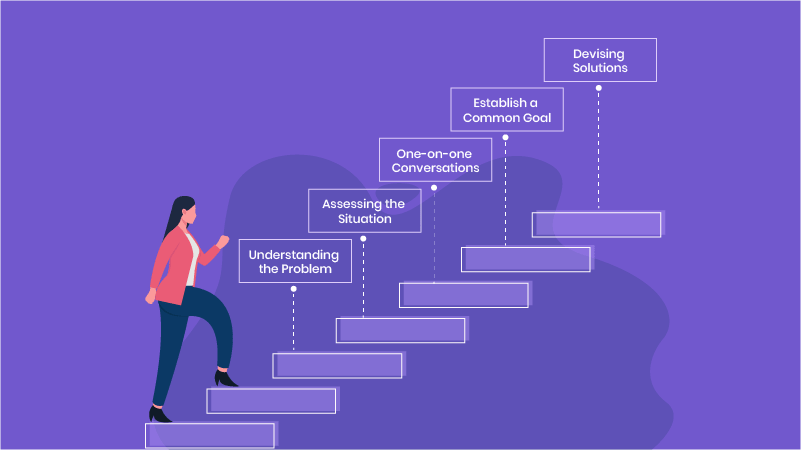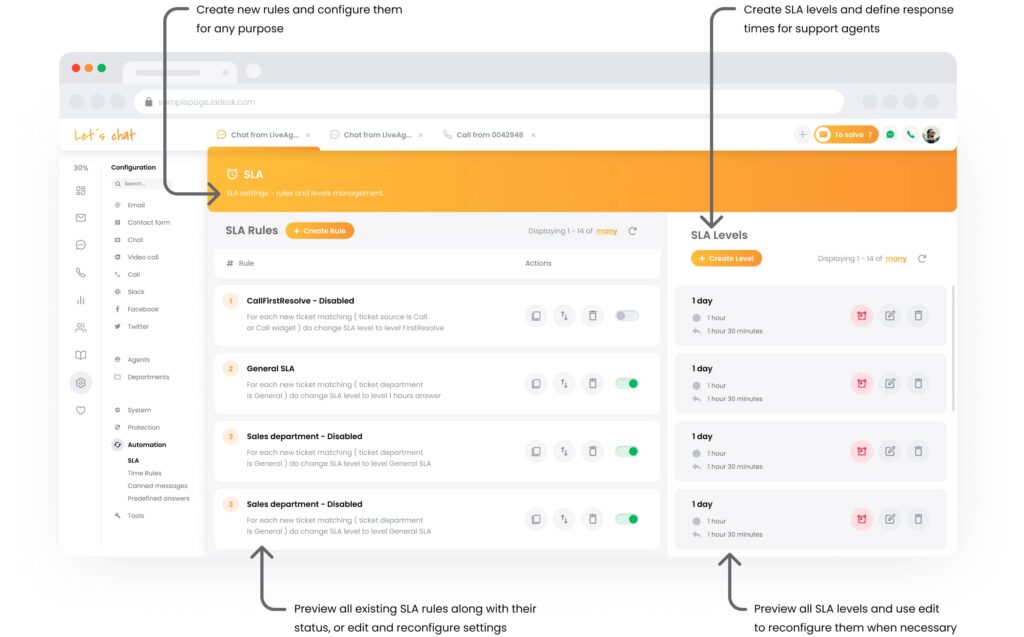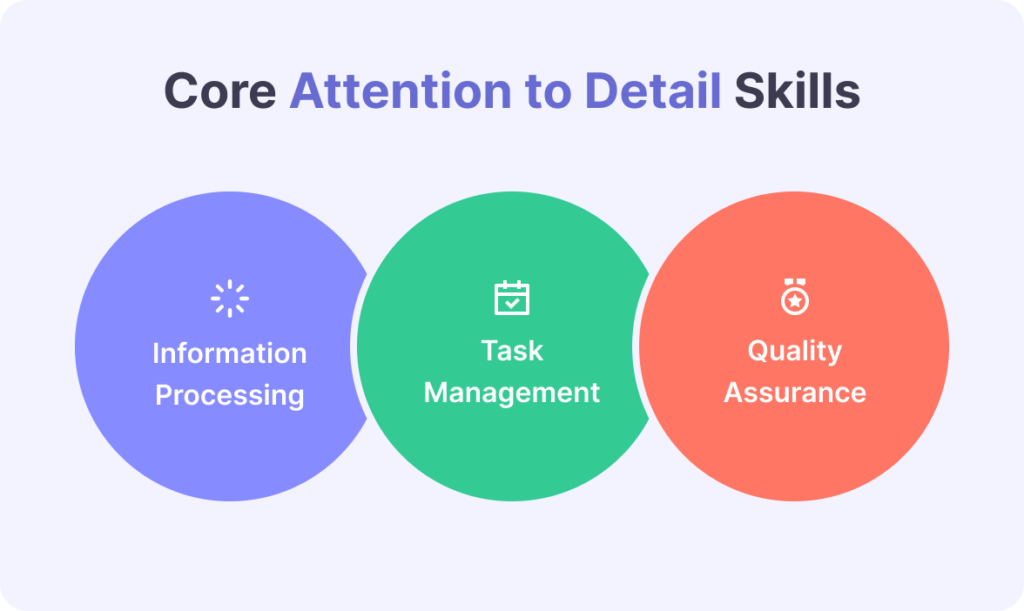Do you know what is one of the main pillars that helps create a solid foundation for a successful business? Providing excellent customer service to your customers. Whether you’re answering questions or fixing issues, the way you handle customer interactions can make a big difference in their overall experience. That’s why customer service agents need to have a particular set of skills.
In this article, you’ll learn about the most essential skills for excellent customer service and discover tips for developing and improving them. Whether you’re new to customer service or looking to up your game, this guide has something for you.
Key takeaways
- As a customer support agent, having certain skills can help you communicate with people more effectively and provide top-notch customer service.
- To deliver the best performance, you must possess hard and soft skills, including technical proficiency, time management, attention to detail, empathy, effective listening, and many others.
- Each skill can benefit your performance in many ways and improve your customers’ overall experience, leading to increased loyalty and satisfaction. They also help create a better work environment among team members and boost productivity.
- Some tips and tricks can help you develop and improve your skills. These include using tools and software, asking for feedback, attending training sessions, and creating checklists and daily routines.
What are customer service skills?
Customer service skills are the abilities you need to interact effectively with customers. Whether you’re chatting online, talking over the phone, or meeting face-to-face, these skills are crucial for solving problems, answering questions, and providing a positive customer experience.
Skills can be divided into two main categories: hard skills and soft skills.
- Hard skills are technical abilities, such as the ability to use specific software, a deep understanding of a product, or strong analytical skills.
- Soft skills are personal attributes that help you interact and connect with others on a more personal level. These skills include empathy, patience, and good communication, among others.

To learn more about soft skills, check out our dedicated article. It’s perfect for anyone who wants to master the art of connecting with customers and building long-lasting relationships.
Top 16 customer service skills to develop
Now that you know the basics, let’s look at the top skills you need to excel as a customer support agent. Plus, we’ll share some tips on how to develop and improve each skill! Developing the right skills requires awareness of the latest customer support trends that shape industry practices.
Effective listening
To master effective listening, you must truly hear what your customer is saying. Take the time to fully understand their issue and let them know you are paying full attention. When you rephrase the issue in your own words and ask the customer if you’ve got it right, it shows that you’re attentive and care about their concerns.
Tip for developing and improving effective listening skills:
- Eliminate distractions and give the customer your full attention.
- Practice active listening
- Use affirmative words like “I understand.“
- Take notes and write down the key points as the customer speaks to help you remember details and show that you’re engaged.
- Don’t interrupt. Let the customer finish speaking before responding, ensuring they feel heard.
Empathy
Empathy is the ability to understand another person’s emotions and see things from their perspective – it’s about putting yourself in the shoes of others. Being emphatic in customer service helps to build a genuine connection and makes the customer feel valued and understood.
70% of consumers say they are more likely to buy from companies where they feel understood.
Tips for developing and improving empathy:
- Practice active listening to truly understand the customer’s feelings and concerns.
- Reflect on what the customer said: “I can see why that would be frustrating for you.“
- Ask questions to get a deeper understanding of the customer’s situation.
- Show genuine interest in the customer’s issue and validate their feelings.
Clear communication skills
You’d be surprised how many people struggle to communicate properly with others. Clear communication skills in customer service ensure information is shared accurately and effectively. Losing focus or using unclear language can lead to misunderstandings, resulting in negative customer experiences and frustrated client
Tips for developing and improving communication skills:
- Use simple and straightforward language that is easy to understand.
- Avoid jargon and overly technical terms unless you are sure the customer will understand them.
- Be concise and to the point to avoid overwhelming the customer with too much information.
- Practice active listening to ensure you fully understand the customer before responding.
- Follow up important points with a summary to ensure clarity, saying something like, “Just to recap, we are going to…“.
Product knowledge
Knowing the products inside and out is crucial for providing excellent customer service. Otherwise, how will you assist your customers when they encounter a problem?
When customer support agents have deep knowledge of their company’s products or services, they can quickly and accurately answer questions, solve problems, and provide helpful recommendations.
If customer support lacks this knowledge, it can lead to frustration, wasted time, and a negative customer experience.
Tips for developing and improving product knowledge:
- Initial training and onboarding process for new employees.
- Regularly review product manuals, updates, and any new training materials provided.
- Attend training sessions and workshops to stay updated on changes or new features.
- Create and use a knowledge base or FAQ document as a reference for quickly finding answers to common questions.
- Implement a buddy system or mentorship program to learn from more experienced colleagues.

Ability to use positive language
In customer service, using positive language is about framing your responses in a way that focuses on solutions and positive outcomes. It helps create a more pleasant interaction and can turn a challenging situation into a constructive one.
For example, instead of saying, “I can’t help you with this issue,” you could say, “While this specific issue is outside my scope, let me find a solution for you.“
Using positive language makes customers feel more valued, leading to a more favorable view of your company.
Tips for developing and improving the skill of using positive language:
- Practice rephrasing negative sentences into positive ones.
- Focus on what you can do for the customer rather than what you can’t do.
- Maintain a calm and friendly tone, even in challenging situations.
- Review common customer service scenarios and practice positive language responses with a colleague or mentor.
Problem-solving skills
Problem-solving is mainly about determining the source of an issue and finding an effective solution. These skills are crucial because they help you address customer concerns quickly and efficiently. However, in order to solve a particular problem, you need to identify its cause and fully understand it before offering a solution.
It’s also always a good idea to offer multiple solutions if the situation allows it. Providing various options enables the customer to choose the one that best fits their needs and preferences, making them feel more in control of the situation. It demonstrates your flexibility and willingness to go the extra mile to resolve their issue.
Tips for developing and improving problem-solving skills:
- Stay calm and think clearly when a problem arises.
- Ask detailed questions to grasp the issue entirely.
- Try breaking down the problem into smaller parts to make it more manageable.
- Acquire more technical knowledge in your field to be able to resolve even more complex issues.
- Practice brainstorming multiple solutions and assessing which one would be the most effective.
- Review past issues and their solutions to learn from experience.
Conflict resolution
The ability to resolve conflicts is not only welcome but expected in scenarios where there are workplace disagreements or customer disputes. Common conflicts include misunderstandings over product features, billing issues, or even interpersonal conflicts among team members.
To successfully resolve any conflict, you’ll often need to read verbal and nonverbal communication cues, remain calm, and try to understand others’ positions. Finding common ground and ensuring the conflict didn’t arise only because of a small misunderstanding can also help in a peaceful resolution.
Tips for developing and improving conflict resolution skills:
- Try to remain calm and composed even in heated situations.
- Listen to all sides involved in the conflict.
- Use neutral language to avoid further escalation.
- Practice empathy to understand the feelings and perspectives of others.
- Clearly explain your point of view.
- Identify and address any possible misunderstandings early on.
- Aim for a win-win solution that will satisfy all involved parties.

Persuasion skills
Persuasion skills are about convincing others to see the value in your product or service. When helping interested prospects overcome doubts, these skills are key. With effective persuasion skills, you can ensure that potential customers don’t slip away and instead see how your product or service can truly benefit them.
However, it’s important only to persuade the customer if the product or service will genuinely benefit them. Pushing customers into something they don’t need or that doesn’t fit their requirements can negatively impact the brand.
Tips for developing and improving persuasion skills:
- Understand your product inside and out so you can highlight its key benefits.
- Use positive language focusing on how the product/service can benefit the customer.
- Build trust by being honest and transparent about what the product or service can and cannot do.
- Practice storytelling to make your product more appealing.
- Learn basic psychology tricks and how you can apply them to make your product more appealing.
Positive attitude
Approaching every interaction with a friendly and helpful mindset is essential to maintaining a positive attitude. In customer service, this is crucial as it can make even difficult situations more manageable. Staying positive will help you calm an upset customer and create a pleasant experience. When you stay positive, you’re more likely to calm an upset customer and create a pleasant experience.
Remaining positive can significantly impact customers’ experience and satisfaction. Customers who feel welcomed and valued are more likely to trust you and be satisfied with the outcome of their interaction, even if the initial reason for their contact was a problem or complaint.
Tips for developing and maintaining a positive attitude:
- Take regular breaks to keep stress levels down.
- Keep your tone cheerful and engaging, even when discussing less pleasant topics.
- Learn to separate personal emotions from professional interactions.
- Celebrate small wins and positive feedback to boost your morale.
Adaptability and flexibility
Adaptability and flexibility are all about adjusting to changing factors, conditions, or environments.
Each customer is different, and no two situations are alike.
You need to be able to respond to various scenarios in a way your customers prefer. Being flexible also means you’re open to learning new things and taking on new challenges, which helps improve the service quality.
Tips for developing and improving adaptability and flexibility:
- Embrace change by viewing new challenges as opportunities to grow.
- Practice active listening to understand different customer needs and preferences.
- Stay organized to handle unexpected situations better.
- Seek feedback to identify areas for improvement.
Technical proficiency
Technical proficiency means having the knowledge and skills to use the tools, equipment, or technology required for your job. It is essential because it allows you to resolve customer inquiries and provide accurate information efficiently. In a customer service context, this could mean knowing how to use customer relationship management (CRM) software, troubleshooting technical issues, or understanding the technical details of your products and services.
For example, if you work for a software company, you need to know how the software works, navigate the interface, and troubleshoot common issues that users might face. Being technically proficient enables you to provide faster and more accurate support, leading to happier customers.
Tips for developing and improving technical proficiency:
- Participate in training sessions and workshops relevant to your role.
- Take advantage of online courses and tutorials to expand your knowledge.
- Practice using the tools and software that are essential to your job.
- Stay updated with the latest advancements and updates in your field.
- Seek guidance and mentoring from more experienced colleagues to learn best practices.
Time management
You need to find a balance between effectively helping customers and staying efficient.
Time management requires prioritizing tasks, managing multiple inquiries at once, and resolving issues quickly without sacrificing quality.
While it’s important to fully understand a customer’s problem, agents must also recognize when to escalate an issue to another team member to ensure all customers receive timely support.
For example, a customer service agent might receive an email, a phone call, and a live chat request simultaneously. Effective time management would involve assessing which issue is most urgent, addressing that first, and then moving on to the others.
Tips for developing and improving time management skills:
- Use time-management tools to keep track of and prioritize tasks.
- Set specific time limits for each customer interaction to ensure you’re balancing attention and efficiency.
- Stay organized with a clear and tidy workspace to manage your tasks better.
- Evaluate your workflow and adjust your strategies to improve efficiency where possible.
For example, tools like LiveAgent offer features such as SLAs (Service Level Agreements) and time rules to help you prioritize issues based on urgency and time sensitivity. These tools ensure that critical tasks are addressed promptly, enhancing overall efficiency and customer satisfaction.

Organization skills
It is not easy to manage multiple tasks and ensure smooth operations simultaneously. Organization skills mean a person can schedule, plan, prioritize, and delegate tasks effectively.
For instance, a well-organized agent can easily keep track of customer inquiries, follow up on pending issues, and ensure timely resolutions. An organized workspace helps boost productivity, meet deadlines, and coordinate resources efficiently.
Tips for developing and improving organization skills:
- Use digital tools like calendars, project management software, and to-do lists to keep track of tasks and deadlines.
- Regularly declutter your workspace to keep it tidy and efficient.
- Create a daily routine or checklist to manage your time and tasks.
- Prioritize tasks based on urgency and importance.
- Delegate tasks when necessary to balance workload and improve overall efficiency.
Analytical skills
These skills allow you to collect and thoroughly analyze information to make informed decisions. So why are analytical skills important in customer service? They enable agents to identify the root cause of problems, ensure accurate solutions, and improve overall customer satisfaction.
For example, an agent might notice that multiple customers face the same issue with a product. By analyzing the data and identifying the pattern, the agent can escalate the issue to the product development team to find a permanent solution to prevent this problem from happening again.
Analytical thinking usually follows a process:
Tips for developing and improving analytical skills:
- Utilize tools and software that help analyze data more efficiently.
- Take courses or attend workshops on data analysis and research methods.
- Gather feedback on your solutions to learn and improve.
Attention to detail
Attention to detail is a highly valued skill in any industry and workplace. Especially when even a small error can become very expensive. Mistakes such as an incorrect number in a budget can lead to financial discrepancies, or a wrong symbol in a code can cause software bugs.
In customer service, overlooking details can result in misunderstandings, incorrect solutions, and dissatisfied customers. Developing strong attention to detail makes you more effective, increases your productivity, and reduces the likelihood of errors.

Having attention to detail means carefully reviewing customer inquiries and ensuring every aspect of their issue is addressed. For instance, if a customer reports a problem with their order, you need to confirm the order number, item description, and shipping address to resolve the issue accurately.
Tips for developing and improving attention to detail skills:
- Always double-check your work before finalizing it.
- Use checklists and templates to ensure you cover all the necessary steps.
- Remember to take breaks to avoid fatigue, which often leads to mistakes.
- Maintain a routine that will improve your organization and give you enough time to review your work.
- Minimize distractions and give your full attention to what you’re working on.
Teamwork
As the saying goes: “Teamwork makes the dream work.” It is the heart and soul of every workplace. Good teamwork can make your work environment more enjoyable and help you complete tasks quickly and efficiently. When everyone works well together, the organization’s goals become easier.
Teamwork skills include conflict management, mutual respect, accountability, workload delegation, trust, and effective communication. For instance, in a customer support setting, agents can rely on each other’s expertise to resolve a complex customer issue faster. One agent might handle the technical aspect while another manages the customer communication, ensuring a smooth and efficient resolution.
Tips for developing and improving teamwork skills:
- Set clear goals for your team to work towards.
- Use team collaboration tools, like project management software, to keep everyone on the same page.
- Engage in team-building activities to strengthen relationships.
- Offer and accept constructive criticism to help each other improve.
Conclusion
Every successful business needs dedicated customer service employees who possess certain skills that allow them to go the extra mile. These skills not only help with answering customer questions but also in creating meaningful relationships, fostering a sense of trust, and building customer loyalty. Connecting with customers on a deeper level can give your company a competitive advantage and help differentiate it from others.
People remember their interactions with customer service, both the good and the bad. That’s why it’s crucial to create positive experiences. Skills such as empathy, a positive attitude, active listening, and problem-solving are vital to achieving this. Additionally, attention to detail, organizational skills, and teamwork are essential to being more productive and efficient. These skills can be developed and improved by following simple yet effective tips, ensuring your team is well-equipped to meet customer needs.
To further enhance your customer service, LiveAgent’s customer service software provides a comprehensive suite of tools to manage customer inquiries efficiently and effectively. Sign up for our 30-day free trial and see how it can transform your customer service operations.
Transform the way you connect with customers!
Don’t settle for less when you can have the best. Try LiveAgent for free for 30 days and discover how it can help you provide exceptional support. Start your free trial today!

 Български
Български  Čeština
Čeština  Dansk
Dansk  Deutsch
Deutsch  Eesti
Eesti  Español
Español  Français
Français  Ελληνικα
Ελληνικα  Hrvatski
Hrvatski  Italiano
Italiano  Latviešu
Latviešu  Lietuviškai
Lietuviškai  Magyar
Magyar  Nederlands
Nederlands  Norsk bokmål
Norsk bokmål  Polski
Polski  Română
Română  Русский
Русский  Slovenčina
Slovenčina  Slovenščina
Slovenščina  简体中文
简体中文  Tagalog
Tagalog  Tiếng Việt
Tiếng Việt  العربية
العربية  Português
Português 


